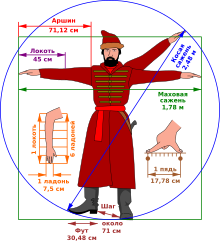The arshin or arşın is an old Turkish and Russian unit of length (Ottoman Turkish: آرشين or آرشون[1])

The Turkish "market arşın" was about 27 inches (690 mm) long.[2] Masonry arşın was 75.774 cm on average (mason's arşın = 24 parmak = 240 ḫaṭṭ)[3] The usage of arşın was gradually abolished during 1931-1933 with the introduction of the metric system.
The Russian word аршин used to be variously transcribed as arshin, archeen, archin, archine, arsheen, arshine.
The Russian arshin had different length at different times. In the 16th century it was 27 inches. In the 18th century Peter the Great standardized in to 28 inches or 71,12 cm. The arshin-length ruler was also called "arshin".[4]
South Slavic peoples used a unit of length named aršin of several types based on the Turkish arşın, under the influence of the Ottoman Empire, described as "the distance from the fingertips to the shoulder"[5]
See also
edit- arş, the Ottoman cubit or historical Russian lokot, all of a forearm length
- Historical Russian units of measurement
Notes
edit- ^ Diran Kélékian, Dictionnaire Turc-Français, Constantinople: Imprimerie Mihran, 1911
- ^ A.D. Alderson and Fahir İz, The Concise Oxford Turkish Dictionary, 1959. ISBN 0-19-864109-5
- ^ Alpay Özdural, Sinan's Arşin, A survey of Ottoman architectural metrology, Muqarnas, vol. 15 (1998). Page 106.
- ^ s:ru:БСЭ1/Аршин, Great Soviet Encyclopedia
- ^ Abdulah Škaljić: „Turcizmi u srpskohrvatskom jeziku"